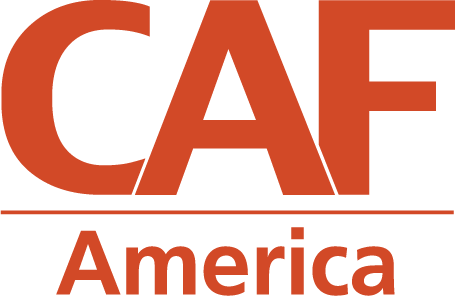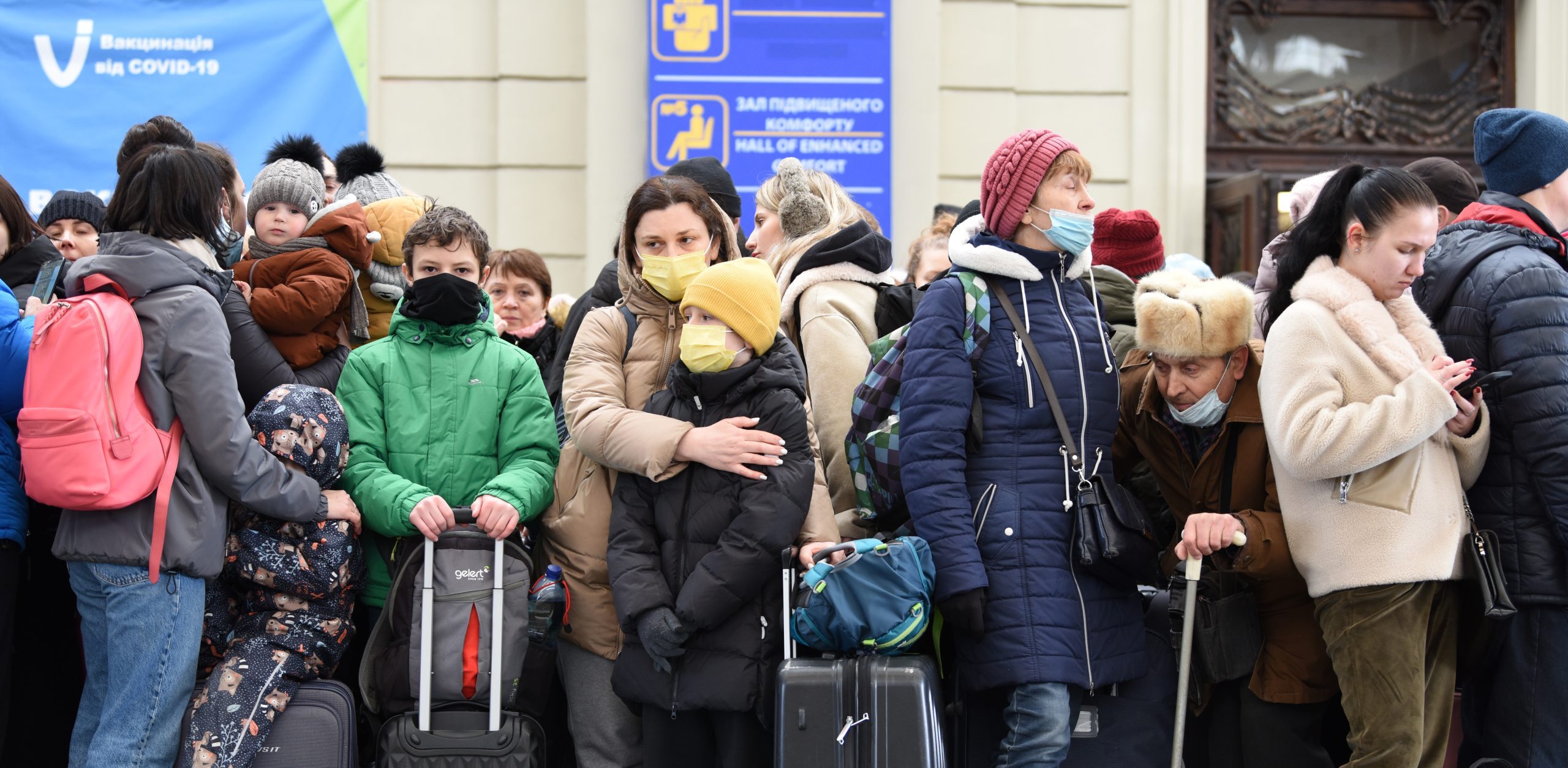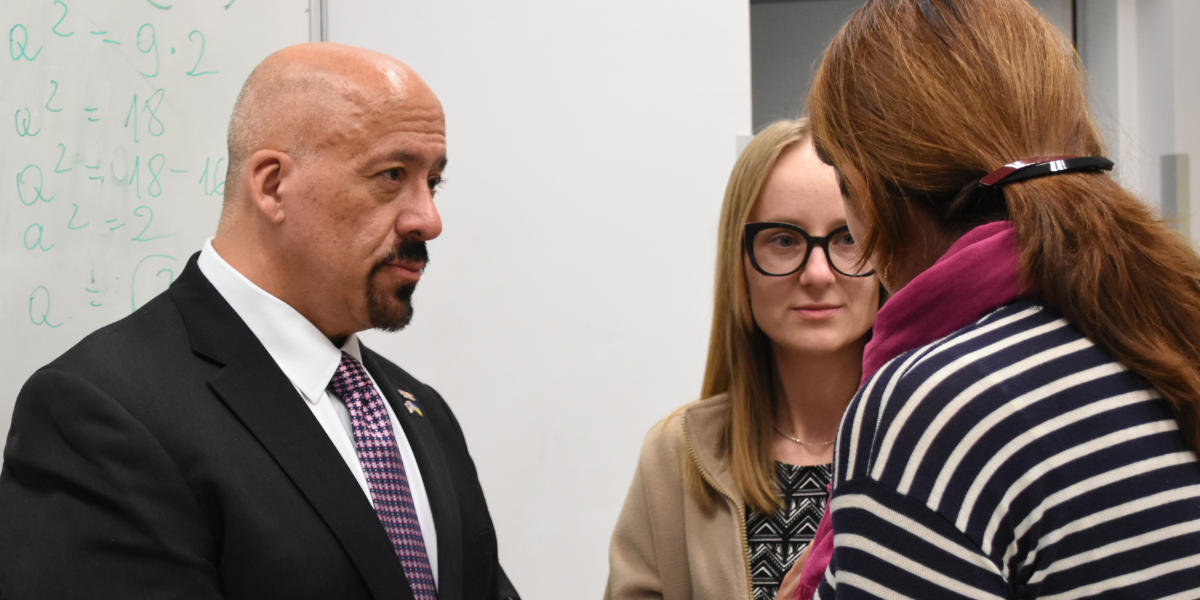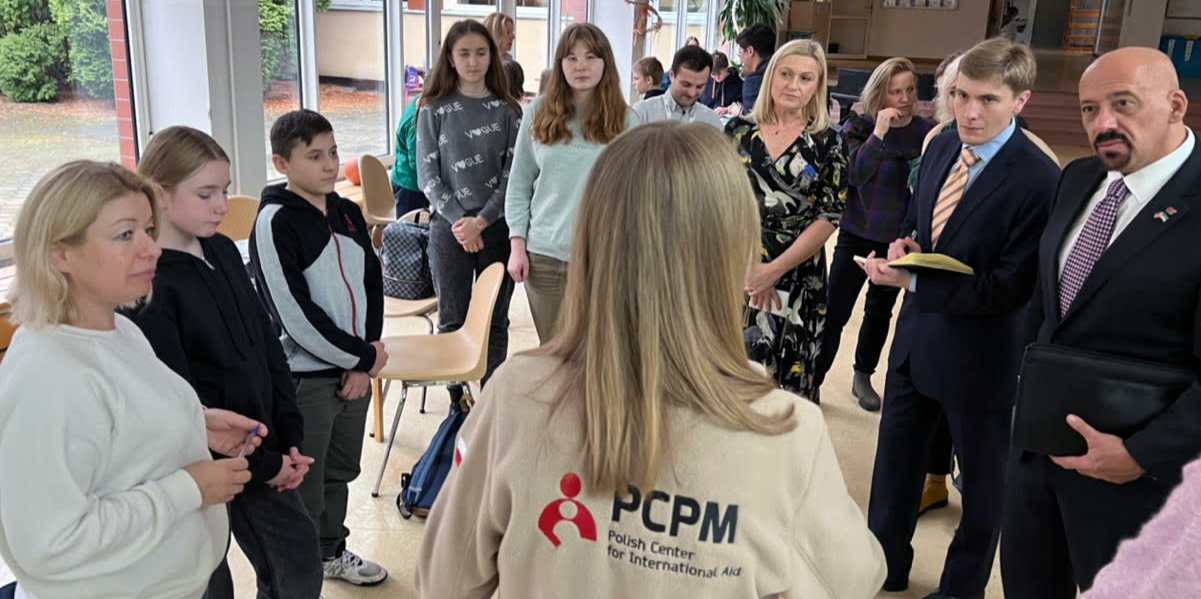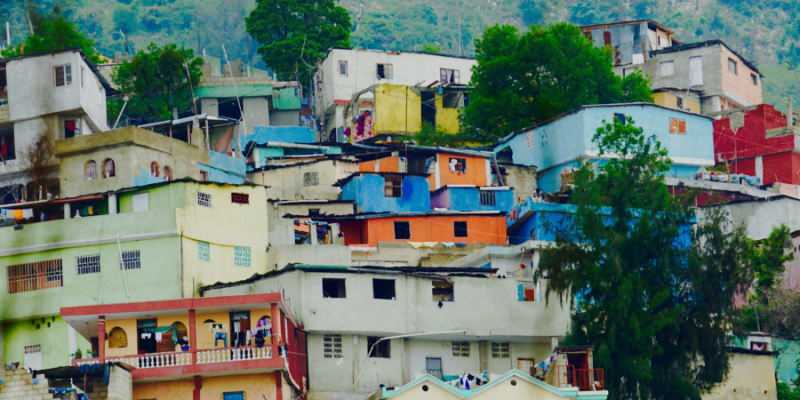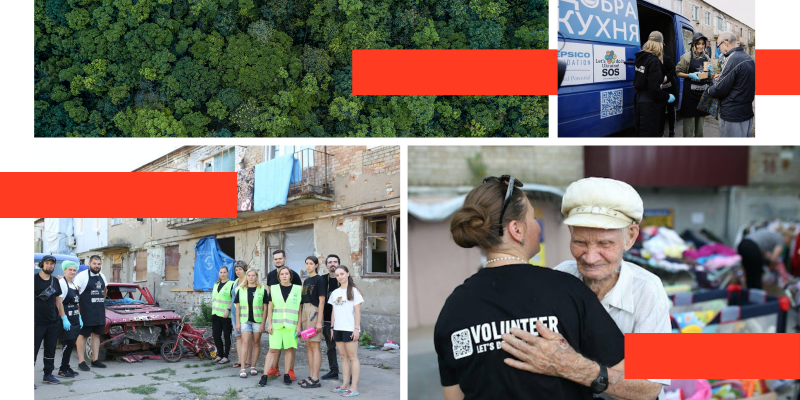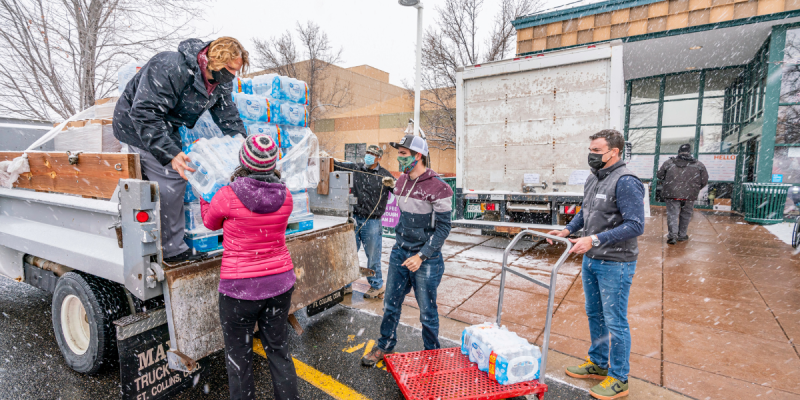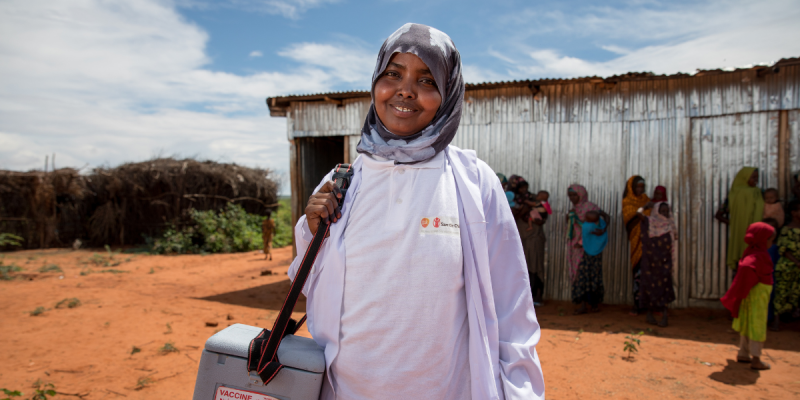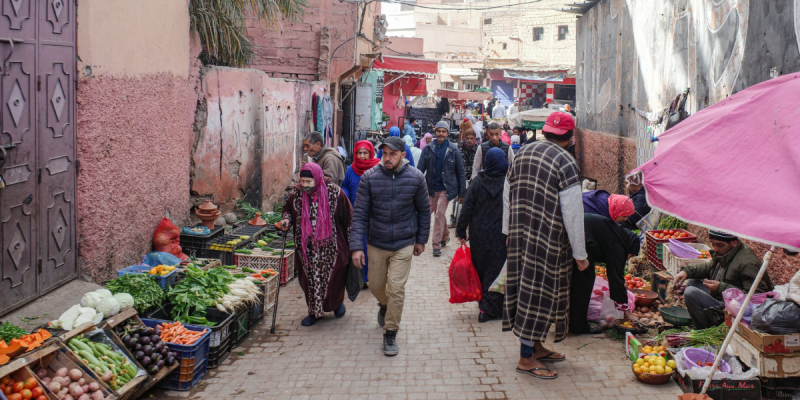Humanitarian Support For Ukrainians
We remain committed to facilitating regulatory-compliant grants to charity partners that follow CAF America’s policies and all relevant U.S. laws and regulations. During this period of rapid change, CAF America is here to help interpret what these new developments mean for our donors and charity partners.
CAF America is committed to serving our donor clients, especially in the face of conflict. Our main focus remains on protecting your ability to give as donors through our regulations, risk, and reputational model. This includes following all U.S. laws and IRS guidelines and protocols related to charitable giving as political situations unfold around the globe.
As an organization committed to enabling cross-border charitable giving, CAF America stands ready to assist US donors wanting to support the ongoing relief efforts. Please reach out to us if there is anything we can do to assist you: info@cafamerica.org or 202-793-2232.
Learn more with CAF America’s thought leadership resources:
Organizations Providing Aid to Ukrainians
The organizations in the list below are working to provide relief and are currently vetted and eligible to receive grants from CAF America. You can support their work by clicking on the organization name or by contacting your fund manager to make a grant from your fund.
Organizations in Ukraine
Kiev Charity Foundation
Kiev Charity Foundation: Kiev Charity Foundation is distributing food and sanitary supplies to Ukrainians throughout the country, organizing logistic centers close to western border of Ukraine to secure food stocks that will be supplied from Europe and further distributed throughout Ukraine. Additionally, the charity is organizing a food center in Kyiv in cooperation with Metro to make food packages available for the citizens of Kyiv.
Let's Do It! Ukraine
Let’s Do It! Ukraine: “Let’s do it, Ukraine team has established a communication network of over 1400 volunteers spread out across the nation for smooth information transition and is ready to engage in the delivery of aid to citizens. From the reports sent by official channels and the Let’s Do It Ukraine team, there is a shortage of food and medicine, and basic gear of survival for Ukrainian citizens, such as hygiene products, first aid kits, socks, thermoses, and everything else that may be needed in shelters and by aid volunteers and territorial defense volunteers.”
Tvoya Opora (Charitable Foundation “Your Support”)
Tvoya Opora (Charitable Foundation “Your Support”): The Foundation’s mission is to ensure that every person in Ukraine who needs help receives it in a timely and high-quality manner. What we do: we restore, strengthen and/or create systems that guarantee social and humanitarian support to those who need it. The Foundation is the only organisation in Ukraine member of the World Heart Federation (a WHO structure).
Ukrainian Red Cross Society
Ukrainian Red Cross Society: “Since the start of the crisis, the Ukrainian Red Cross has sent to the regions of Ukraine over 5,418 tonnes of humanitarian cargo. Every day the staff and volunteers in logistical centres receive, sort, assemble, and send to the regions hundreds of tonnes of cargo containing food, hygienic products, medicines, water, bed linen and other essentials. Our volunteers and employees deliver humanitarian aid, provide first aid, first psychological aid, accompany evacuation from hotspots, provide psychosocial support to the affected people, inform about mine danger, international humanitarian law and first aid. Without stopping, almost 24 hours a day, Ukrainian Red Cross works to help all citizens who need it the most.”
Multinational Nonprofit Organizations
Doctors Without Borders
Doctors Without Borders USA: Doctors Without Borders/Médecins Sans Frontières (MSF) is setting up emergency response activities in and around Ukraine. In the Ukrainian city of Mariupol, our teams have already distributed medical kits to treat war-wounded people, and have provided telemedicine training in trauma care to 30 surgeons from eastern Ukraine. Our emergency teams have arrived at the Polish-Ukrainian border and are trying to get staff and supplies into Ukraine, and set up emergency response activities across both sides of the border. Teams will also carry out assessments along Ukraine’s border with Russia and Belarus.Our staff have seen many exhausted refugees cross over the Ukraine-Poland border on foot, in cars, and on buses—some with infants less than one month old. We have donated basic shelter items to a reception center in Poland and are working to step up our response.
Red Cross
Ukrainian Red Cross Society: “Since the start of the crisis, the Ukrainian Red Cross has sent to the regions of Ukraine over 5,418 tonnes of humanitarian cargo. Every day the staff and volunteers in logistical centres receive, sort, assemble, and send to the regions hundreds of tonnes of cargo containing food, hygienic products, medicines, water, bed linen and other essentials. Our volunteers and employees deliver humanitarian aid, provide first aid, first psychological aid, accompany evacuation from hotspots, provide psychosocial support to the affected people, inform about mine danger, international humanitarian law and first aid. Without stopping, almost 24 hours a day, Ukrainian Red Cross works to help all citizens who need it the most.”
International Committee Of The Red Cross: Since 1993, the ICRC has been present in Ukraine, expanding its presence in 2014, and reinforcing reinforced operations in February 2022. The organization leads on promoting protection of civilians and urging compliance with International Humanitarian Law. ICRC’s multidisciplinary response addresses emergency and longer-term needs, provides food and cash assistance, supports livelihoods and improvs access to water, medical care, first aid training, and other essential services. The ICRC staff also visits people deprived of their freedom, restores family links, supports missing people’s families and efforts to clarify the fate of missing persons. The ICRC works closely with the Ukrainian Red Cross Society in assistance to those in need
International Federation Of Red Cross And Red Crescent Societies: “IFRC will be launching an emergency appeal, and we are working closely with ICRC and National Societies in Ukraine and neighbouring countries to co-ordinate our movement response.”
Polish Red Cross: “In connection with the tragic events in Ukraine, the Polish Red Cross is launching a fundraiser under the slogan #n PomococUkrainie. The Polish Red Cross is prepared to organize help for Ukrainian citizens who have suffered as a result of the armed conflict. The Polish Red Cross monitors the situation on an ongoing basis and adjusts its activities to the prevailing conditions. We are launching a fundraiser to help victims of the war in Ukraine. All our actions will be coordinated with the activities of the International Federation of Red Cross and Red Crescent Societies, the International Committee of the Red Cross and the Ukrainian Red Cross, which is operating at the scene, says Jerzy Bisek, president of the Polish Red Cross.The funds raised will be allocated in the first place, inter alia, to for the purchase of food, dressings and other priority needs. The Polish Red Cross is ready to help refugees from Ukraine. Already in mid-February this year. The Lublin Regional Branch of the Polish Red Cross has provided camp beds, mattresses and sleeping bags, which will allow to prepare 370 places for Ukrainian citizens in need at border crossings in the Lublin region. The Subcarpathian Regional Branch of the Polish Red Cross in Rzeszów is also prepared for action.”
Bavarian Red Cross – district association Munich (Bayerisches Rotes Kreuz – Kreisverband München): “Right now, we are preparing everything to provide shelter and medical needs. We, as the Munich Red Cross, are preparing a facility for medical screening but also for vaccination against COVID -19. The pandemic is still present and we want to give the best possible support and aid relief. In particular, the mother and children need our special care. We are getting prepared for all possible needs, especially for babies, small infants but also for children. They need our support! The Munich Red Cross is taking every possible effort to provide them with vaccination, medical screening, shelter, but also support wherever needed. We are currently taking into consideration to lease space for a medical screening and vacation center, with the required staff for nursing but also medical doctors. We want to provide them with the best possible support, but also to ensure that they are in a safe and sanitary environment.”
French Red Cross: “The scale of displacement caused by the intensification of violence in Ukraine could surpass anything that’s been seen in Europe in years. At least 150,000 people have left their homes due to the conflict escalation, and many have crossed into neighbouring countries, according to the UN. Like the entire Red Cross Movement, the French Red Cross is really concerned with the fate of people fleeing in the midst of ongoing fighting. Displaced people must be protected and their access to a safe place granted. The French Red Cross has therefore launched a fundraising appeal to support the actions of the ICRC and the Ukrainian Red Cross as far as the security situation permits; to help National Societies in neighboring countries, in conjunction with the International Federation of Red Cross and Red Crescent Societies (IFRC), which welcome and help refugees leaving Ukraine; and to develop specific actions according to the evolution of needs in the field.”
Hungarian Red Cross: “More than 150 000 refugees arrived to Hungary during the first days of the crisis in Ukraine, the whole country is welcoming them and taking care of them. Mainly women and children are arriving. There are two main activities we are working on: supporting refugees at the border area, in Budapest and nationwide where they arrive by trains, buses, etc.; and aid to Ukraine Red Cross vis-a-vis working on aid transports to Ukraine Red Cross and planning to deliver small and larger consignments of donations based upon their needs.”
Belgium Red Cross, Flanders (Belgische Rode Kruis/Rode Kruis-Vlaanderen): “The crisis in Ukraine has emerged as one of the greatest humanitarian emergencies in Europe of this decade, and the Red Cross has been responding to the growing humanitarian needs. In Belgium, the Red Cross has been present from the outset at the registration and guidance centre for people who have fled Ukraine, initially set up at the former hospital in Bordet and moved to Heysel since Monday. The Belgian Red Cross is working in close cooperation with the authorities so that this initial reception takes place in the most dignified and humane conditions possible. It goes without saying that these actions and this support must change in line with the changing situation and needs.”
SOS Children’s Villages
SOS-Kinderdörfer weltweit Hermann-Gmeiner-Fonds Deutschland e.V.: “SOS Children’s Villages are currently preparing emergency aid for at least 15,000 people in Ukraine. This includes, for example: transport to safe areas; accommodation in rented accommodation; groceries, toiletries and blankets; medical help; psychosocial support after stress and shock. In particular, the aid organisation wants to support parentless children as well as foster families and needy families. Concrete measures are continuously being developed to enable and ensure the necessary assistance.”
SOS Children’s Villages Poland (Stowarzyszenie SOS Wioski Dzieciece W Polsce): “SOS Children’s Villages Poland has welcomed around 100 Ukrainian children from SOS Ukraine with their caregivers. We will take in even more. We know that they will stay with us for an indeterminate time. We need funds to take care of children, for psychological help, food, medical help and medication, transport, and as soon as possible: education. Our educators, caregivers, staff, but also children and youth under our care are all acting in a wonderful way doing what they can to make Ukrainian traumatized children feel most welcomed.”
Organizations in Europe
Europe
European Food Banks Federation: “Following the rapid escalation of events and Russia’s attack on Ukraine, on 28 February 2022 the European Food Banks Federation convened an urgent meeting with all the Presidents of its members in 29 European countries and a representative of The Global FoodBanking Network from the USA. The representatives of the Kyiv City Charity Foundation “Food Bank” testified that Kyiv is completely isolated while in other cities, where the security situation permits, the Kyiv City Charity Foundation “Food Bank” continues its activities to provide food assistance to the charitable organisations that are also hosting refugees. It is anticipated that Kyiv will be depleted of its food reserves within one month. In neighbouring countries, Food Banks recover and deliver food to refugee centres, particularly in Hungary, Moldova, Poland, Romania, and Slovakia. The requests for help are varied but they ask for support in the medium and long term as their resources and strength cannot last much longer. The priority of the European Food Banks Federation, with unanimous approval of the meeting participants, is to assist the Kyiv City Charity Foundation “Food Bank” and the Food Banks in the neighboring countries such as Hungary, Moldova, Poland, Romania, and Slovakia. As a sign of concrete solidarity, the Board of Directors of the European Food Banks Federation has already allocated 300.000 € to provide immediate food aid and support. A first donation has already been transferred to the Kyiv City Charity Foundation “Food Bank”.”
Bulgaria
BCause Foundation: From the early days of the crisis in Ukraine, our partner in Bulgaria BCause has been fundraising for Ukraine humanitarian relief and collecting essential items. BCause is partnering with the Association of Ukrainian Organisations in Bulgaria (‘Mati Ukraine’) that represents the Ukraine diaspora in Bulgaria. The campaign is called ‘Mother Ukraine’. Today 10 March they report volunteers successfully delivered medicines to the hospital in Ivano-Frankivsk, a city in the West of the country that has received many victims of the conflict from Kharkiv and Dnipro in the East. Yesterday 9 March four shipments of humanitarian aid successfully travelled to the Ukraine and delivered food packages, hygiene materials, warm clothing and other essentials including diapers and baby milk. A local company Telus donated 80 tablets for refugee children and company A1 has donated mobile phones and sim cards for the volunteers to coordinate their efforts. The campaign is also supporting refugees who are arriving in their thousands in Bulgaria. Many people from Sophia, the capital city were BCause is based, have volunteered to sort donations with as many as 150 people helped over the weekend.
Czechia
People In Need: “More than one million people have now fled Ukraine since the beginning of the crisis, and the number is rising rapidly, according to the UN. The Ukrainian government estimates there will be as many as 5 million refugees in the worst-case scenario. Under these circumstances, People in Need has mobilized extensive resources to support the population of Ukraine. Our core team has transferred from Kyiv to Lviv, where a new office has opened. New activities are being planned to address the needs of people in different regions. We have adapted to new challenges and organized water delivery to people displaced by ongoing conflict in eastern Ukraine. Experienced psychologists are constantly providing psychological support to the population on our telephone hotline 0800210160. People in Need will provide financial support to local NGO partners to support displaced people with water, food, hygiene, and other urgent humanitarian needs in Dnipropetrovsk, Zaporizhzhia and Sviatohirsk. Our activities will also be focused on the western part of Ukraine. Specifically, on the border crossings to Poland, where people are waiting for several days in long queues of cars to cross the border. Local authorities and local communities have organized food collection points and transportation of people to these locations. We have engaged in distributing hygiene items and important information at these locations.”
France
French Red Cross: “The scale of displacement caused by the intensification of violence in Ukraine could surpass anything that’s been seen in Europe in years. At least 150,000 people have left their homes due to the conflict escalation, and many have crossed into neighbouring countries, according to the UN. Like the entire Red Cross Movement, the French Red Cross is really concerned with the fate of people fleeing in the midst of ongoing fighting. Displaced people must be protected and their access to a safe place granted. The French Red Cross has therefore launched a fundraising appeal to support the actions of the ICRC and the Ukrainian Red Cross as far as the security situation permits; to help National Societies in neighboring countries, in conjunction with the International Federation of Red Cross and Red Crescent Societies (IFRC), which welcome and help refugees leaving Ukraine; and to develop specific actions according to the evolution of needs in the field.”
Medecins Sans Frontieres (France): “MSF teams remain in Ukraine, and we are currently seeking ways to adapt our response as the conflict situation evolves. We are deeply worried about the consequences of the conflict for Ukrainian people and communities. We see on the roads that tens of thousands of people are frightened and on the move. The situation is fast-evolving, so we are mobilizing general emergency-preparedness response to be ready for a variety of potential needs. Our teams in Belarus and Russia stand ready to provide humanitarian assistance if needed and we are looking to send teams to other neighbouring countries, especially Moldova and Poland, to be ready on stand-by, either for response in Ukraine or to provide humanitarian medical assistance to refugees seeking asylum abroad. Our supply centers are currently working on readying medical kits for rapid dispatch. We will need to see over the coming period what access will be possible in a safe and impartial manner for humanitarian assistance.”
Germany
Bavarian Red Cross – district association Munich (Bayerisches Rotes Kreuz – Kreisverband München): “Right now, we are preparing everything to provide shelter and medical needs. We, as the Munich Red Cross, are preparing a facility for medical screening but also for vaccination against COVID -19. The pandemic is still present and we want to give the best possible support and aid relief. In particular, the mother and children need our special care. We are getting prepared for all possible needs, especially for babies, small infants but also for children. They need our support! The Munich Red Cross is taking every possible effort to provide them with vaccination, medical screening, shelter, but also support wherever needed. We are currently taking into consideration to lease space for a medical screening and vacation center, with the required staff for nursing but also medical doctors. We want to provide them with the best possible support, but also to ensure that they are in a safe and sanitary environment.”
SOS-Kinderdörfer weltweit Hermann-Gmeiner-Fonds Deutschland e.V.: “SOS Children’s Villages are currently preparing emergency aid for at least 15,000 people in Ukraine. This includes, for example: transport to safe areas; accommodation in rented accommodation; groceries, toiletries and blankets; medical help; psychosocial support after stress and shock. In particular, the aid organisation wants to support parentless children as well as foster families and needy families. Concrete measures are continuously being developed to enable and ensure the necessary assistance.”
Hungary
Hungarian Red Cross: “More than 150 000 refugees arrived to Hungary during the first days of the crisis in Ukraine, the whole country is welcoming them and taking care of them. Mainly women and children are arriving. There are two main activities we are working on: supporting refugees at the border area, in Budapest and nationwide where they arrive by trains, buses, etc.; and aid to Ukraine Red Cross vis-a-vis working on aid transports to Ukraine Red Cross and planning to deliver small and larger consignments of donations based upon their needs.”
Netherlands
Poland
The Kraków Foodbank (Bank Żywności w Krakowie): “The Kraków Foodbank is actively taking part in preparing Kraków and the Lesser Poland voivodeship for the coming wave of refugees. We specialize in collecting food and distributing it to the poverty-stricken. Additionally, we plan to give support to humanitarian aid transports bound for Ukraine dispatched from our region. We will involve our entire team as well as volunteer workers, vehicles (4 delivery trucks), storage space (1000 sqm). We will be reaching out to 250 of our regular commercial donors for donations to aid refugees from Ukraine, as well as to our 200 NGO partner organizations with whom we will be organizing collections of funds, food and hygiene items.”
Good Initiatives Foundation (Fundacja Dobrych Inicjatyw): “Collection For Ukraine: We are launching the #FDIAid program , the purpose of which is to raise funds and in- kind assistance for Ukraine and refugees in Poland. In the coming days and weeks, we will inform you about the actions taken and the directions of help. We are in contact with friendly non-governmental organizations from Ukraine with whom we cooperated in previous years as part of the programsupport for children and youth from eastern Ukraine.”
Polish Center for International Aid Foundation (PCPM): “Polish Center for International Aid has immediately initiated a fundraising campaign to finance the work of Ukrainian humanitarian workers who cooperate on-site with the Polish foundation (polish workers were not sent to the Ukraine for safety reasons). Those humanitarian workers help to evacuate the inhabitants from the most dangerous areas. They also created a transit point of humanitarian aid placed at the west bank of Dnieper river for people fleeing from the war. The points of humanitarian aid are also created on the trails used by refugees traveling from the East to the West of Ukraine. Each one offers Ukrainian people the protection, nutrition, a place to sleep and rest before further journey.
Polish Red Cross: “In connection with the tragic events in Ukraine, the Polish Red Cross is launching a fundraiser under the slogan #n PomococUkrainie. The Polish Red Cross is prepared to organize help for Ukrainian citizens who have suffered as a result of the armed conflict. The Polish Red Cross monitors the situation on an ongoing basis and adjusts its activities to the prevailing conditions. We are launching a fundraiser to help victims of the war in Ukraine. All our actions will be coordinated with the activities of the International Federation of Red Cross and Red Crescent Societies, the International Committee of the Red Cross and the Ukrainian Red Cross, which is operating at the scene, says Jerzy Bisek, president of the Polish Red Cross.The funds raised will be allocated in the first place, inter alia, to for the purchase of food, dressings and other priority needs. The Polish Red Cross is ready to help refugees from Ukraine. Already in mid-February this year. The Lublin Regional Branch of the Polish Red Cross has provided camp beds, mattresses and sleeping bags, which will allow to prepare 370 places for Ukrainian citizens in need at border crossings in the Lublin region. The Subcarpathian Regional Branch of the Polish Red Cross in Rzeszów is also prepared for action.”
SOS Children’s Villages Poland (Stowarzyszenie SOS Wioski Dzieciece W Polsce): “SOS Children’s Villages Poland has welcomed around 100 Ukrainian children from SOS Ukraine with their caregivers. We will take in even more. We know that they will stay with us for an indeterminate time. We need funds to take care of children, for psychological help, food, medical help and medication, transport, and as soon as possible: education. Our educators, caregivers, staff, but also children and youth under our care are all acting in a wonderful way doing what they can to make Ukrainian traumatized children feel most welcomed.”
Polish Humanitarian Action: “We provide direct help for people who have had to flee their homes in Ukraine, including food, psychological help and other forms of support. Our support covers people affected by the conflict, including those moving within the country as well as refugees coming to Poland. In addition, we are actively delivering humanitarian aid within Ukraine in the form of convoys, support centers, and distribution of meals to those in need.”
Romania
Fundatia World Vision Romania: “The war situation from Ukraine started a humanitarian crisis at Romanian border, more than 47.000 refugees – most of them mothers with children need emergency intervention, social and emotional support. Children whose lives were affected by war conflict suffer grave long-term consequences. A child who is out of education, his entire future is at risk. In emergency situations, education can give refugee children a sense of structure, direction and security. Helping mothers to recover their strengths and getting children back into an education settings quickly after a crisis can prevent them from falling into other crisis situation were child is expose to exploitation, neglecting, abuse, human traffic., depression…. .etc. Child-friendly spaces can be used by all children and adolescents (anyone under age 18), they are commonly used in working with vulnerable children, as well as those who have experienced trauma. Our activities at the Romania-Ukraine border include: Setting up – and endowing with educational & hygienic materials – three safe places at border to provide “ Child friendly Spaces/ Baby and Mother friendly Spaces” for mothers and children; organizing recreational and therapeutic daily activities with children refugees and providing nutritional/food kit for mother & children; developing individual and group counseling for mothers and children/ providing assistance social & psychological first aid; informing mothers and children about hygienic rules and measures to prevent pandemic diseases; and providing educational kit for every child.”
Organizations around the World
Mexico
Committee to Help Natural Disasters and National Emergencies (Comite de Ayuda a Desastres Naturales y Emergencias Nacionales [CADENA]): “As a result of recent events in the Ukrainian territory, CADENA expresses its support for civil society that has been affected by the armed situation, and we regret the effects that it may have. After carrying out an extensive evaluation of the possible actions to be taken, we have sent a task force to the country, with the purpose of articulating the Jewish communities of Warsaw and Krakow. Collection centers will be created, deliveries of medical material, essential supplies, as well as psychosocial support for those affected.”
United Kingdom
ShelterBox United Kingdom: ShelterBox is activating a team to eastern Europe to assess the humanitarian needs of people displaced by the Ukraine crisis. Specializing in emergency shelter and basic household items the ShelterBox team is coordinating with other humanitarian organizations in the region to ensure they reach the most vulnerable who are often women, children, elderly and handicap. ShelterBox adapts aid packages to each situation and in past, similar responses, they have provided warm winter blankets, mattresses, winter clothing and heaters, solar lights, shelter kits and tents.
British Red Cross Society: “We’re part of the Disasters Emergency Committee (DEC), which unites 15 member charities who are experts in humanitarian aid and specialists in different areas of disaster response.The DEC launches appeals during times of monumental suffering, which is the case in Ukraine right now. Donations currently support the following: providing food, first aid, clean water, shelter support, warm clothing, hygiene parcels and medicines; supporting hospitals and healthcare facilities; supporting fire fighters and civil protection units; training people up in life-saving first aid; helping families stay in contact with each other; educating people on the risks of explosives; repairing vital infrastructure; helping to repair homes, healthcare centres, schools and community centres.”
International Medical Corps UK: “International Medical Corps is expanding its relief efforts inside Ukraine in response to the war there, as well as in neighbouring countries, to provide medical, mental health and protection services to the millions of people affected by the conflict, including refugees. International Medical Corps is on the ground in Ukraine, has created a logistics and support hub in Poland, and is working with health agencies and local partners to provide the following relief services: Primary and emergency health services from medical professionals, including specialist physicians, general practitioners and nurses; Mental health and psychosocial support (MHPSS), critical for people affected by war; Gender-based violence (GBV) response services, and protection services for women, children and other at-risk people who face risks during conflict; Medicines and medical supplies, including PPE, to help provide critical care and prevent infectious diseases like COVID-19 among refugees and displaced populations”
The Central British Fund for World Jewish Relief: “We are proactively working with our 29 partners in the country, who describe fear, panic and disbelief, and are doing everything they can to protect themselves, their families and our vulnerable client groups. We are responding to the most urgent humanitarian needs within and beyond Jewish communities, and are prioritising the transfer of emergency funds to our partners. In Ukraine, we are responding across the country: providing cash transfers, food and medical equipment to existing partners and clients; continuing homecare and providing psychological support to older and vulnerable people; assisting our partners to evacuate vulnerable people where it is safe to do so; working with the Ukrainian Embassy in the UK to provide over 40,000 emergency food packages; and we are organising a massive shipment of humanitarian relief items into the country for those who need it most, including food ration packs, hygiene equipment and medication. In Poland and Moldova, we are: helping our partners scale up their capacity to welcome refugees; providing cash transfers, legal advice, food and shelter for displaced Ukrainians; and we are sending specialists from our Humanitarian and Refugee teams to Poland and Moldova to support our partners there in expanding their capacity to assist refugees fleeing Ukraine. In the UK, we have offered the government our support and expertise in refugee employment, and have urged the Home Office to extend humanitarian visas to Ukrainians. We are assessing how we can best use our expertise in Ukraine and with refugees to assist with the Government’s new ‘Homes for Ukraine’ scheme.”
Samaritans Purse International: “Samaritan’s Purse has established an Emergency Field Hospital on the outskirts of Lviv, in western Ukraine, to care for those suffering as war rages on. The initial patients arrived on 14th March. Our very first patient was a woman named Marina from Malyn, a city west of Kyiv… She fell and injured her arm while escaping into a basement/bomb shelter. She suffered for nine days before arriving at our field hospital after her travels. She cried tears of relief as one of our doctors told her: “We can fix this for you.” The field hospital has two operating rooms, with capacity for 14 major surgeries or 30 minor surgeries per day. There are nearly 60 total inpatient beds, including four intensive care unit beds and four step-down beds. The emergency room can handle 100 patients per day. The facility also has a pharmacy and its own water and sanitation system. Samaritan’s Purse has also opened a 24-hour clinic, or medical stabilisation point, at a train station in Lviv where we are seeing dozens of patients a day. In Moldova, we’ve set up a mobile medical unit at a large stadium housing refugees in Moldova. Also, we are providing hygiene kits to refugee families and delivering food to local churches who will distribute them to fleeing Ukrainians.”
Save the Children UK: “More than 2.5 million people have crossed the borders from Ukraine into neighbouring countries since the 24th of February. Half are estimated to be children. Save the Children has been operating in Ukraine since 2014. Our teams are ready to provide life-saving assistance such as food, water, cash transfers, and safe places for children. We are delivering essential humanitarian aid to children and their families including the provision of winter and hygiene kits. We are also providing cash grants to families so they can meet their basic needs such as food, rent and medicines. Our specialist teams are providing children with access to safe, inclusive, quality education and are working with schools and community centres to help children overcome the mental and psychological impacts of their experiences of conflict and violence. Our Child Emergency Fund allows us to respond wherever the need is greatest. It helps us to reach children quickly with the essentials they need to survive.”
UK for UNHCR: “UNHCR has been working in Ukraine since 1994 and established a country office the following year in 1995, supporting refugees and asylum-seekers, stateless people, and internally displaced and other conflict-affected persons. UNHCR and its teams work in both Government controlled and non-Government controlled areas, and in neighbouring countries, delivering humanitarian assistance such as emergency shelter, winter relief (such as winter clothing and blankets) and psychological support to people in need. With teams across Ukraine and in neighbouring countries hosting refugees from Ukraine, UNHCR is providing protection and humanitarian assistance, including emergency shelters, repairs for homes damaged by shelling, emergency cash assistance, and protection such as psychological support. Winter relief is also provided for displaced people in need as temperatures plummet, such as winter clothing and blankets. UNHCR has also provided training for Ukrainian civil society organisations involved in helping to protect refugees and other displaced families. During the coronavirus pandemic, UNHCR has worked to strengthen the capacity of health and social care providers in Ukraine, as well as advocating for asylum-seekers to have free, equal access to healthcare and vaccination against COVID-19.”
Unicef UK: “More than 3 million people have now fled Ukraine, with the number expected to climb to 5 million. UNICEF UK has been working tirelessly to keep children safe since this crisis began and we are determined to remain in Ukraine to reach the most vulnerable children and families. We are helping to provide families with access to clean water and healthy food. We are delivering lifesaving supplies to support families who have been forced to flee and are working closely with local health facilities to ensure they have the vital supplies needed. We are helping to make sure that child protection services continue. We are working with our partners and the UNHCR to assess the refugee situation across neighbouring countries. In neighbouring countries we are delivering Blue Dot safe spaces with our partners, which will provide care and support, information to families seeking refuge, psychosocial support, water and sanitation supplies, safe spaces for mothers and children, protection for unaccompanied and separated children and more.”
World Vision UK: “At Ukraine’s borders with Poland, Romania, Hungary, Slovakia and Moldova, huge numbers of people are arriving with only what they can carry. In many places there are long waits to cross and scant facilities waiting for them on the other side, with temperatures dropping below freezing overnight. World Vision UK is part of the DEC (Disasters Emergencies Committee) which is launching an appeal to help those affected. We are assessing the likely long-term needs of the displaced so we can cushion the impact of this conflict. We are trying to find accommodation for refugees, provide food, phone cards and of course helping people get transport to their desired destinations. We are organising teams to provide psychosocial counselling. We want children to be safe and we will work to create programmes that are protective and caring, so a child’s development is not harmed.”
International Rescue Committee UK: “The IRC is on the ground in Poland, and working with local partners in both Poland and Ukraine. Working with partners allows us to bolster the crisis response of people who have already been active in the community and are experts on the local context. In the initial phase of our response, the IRC is working through partners to provide critical information services, legal counselling and psychological support to some of the 1.6 million people that have arrived in Poland from Ukraine. We are also procuring medical supplies and essential items such as sleeping bags and blankets for distribution at reception centres on the Ukrainian/Polish border. In Ukraine, we are working with partners to provide blankets, sleeping bags and warm clothes to people who have been displaced. We are also providing cash so people in need can purchase what they need the most.”
Disasters Emergency Committee: “The DEC exists to raise funds quickly and efficiently at times of crisis overseas such as this. A maximum of 10% of the money we raise is spent on fundraising and running costs and the rest goes to our member charities to carry out their vital work. DEC member charities are experts in humanitarian relief with decades of experience responding to crises around the world – from earthquakes to floods as well as conflicts. No one expected to be responding to this kind of crisis in Europe in 2022, but DEC charities are scrambling to help people affected both inside Ukraine and in neighbouring countries. Five DEC charities are already responding directly or through local partners within Ukraine, while others are working in Poland, Hungary, Moldova, Slovakia and Romania – to help civilians fleeing the country to escape the conflict: Age International is responding inside Ukraine via local partners and in neighbouring countries to support older people. The charity aims to reach 400,000 people, providing emergency food and water kits, medical, hygiene and dignity kits and support in response to trauma that so many older people will be experiencing; Ukrainian Red Cross volunteers are providing first aid, warm clothes, and support in shelters and metro stations; International Committee of the Red Cross (ICRC) is working to restore water supplies, provide support to medical facilities, and provide food and shelter to those affected by the fighting; in neighbouring countries, national Red Cross societies are helping those fleeing Ukraine; CARE International has partnered with a local partner to distribute urgently needed emergency supplies such as food, water, hygiene kits and cash to cover daily needs; CAFOD, through its international partner, Caritas, has 19 centres across Ukraine running warm and safe ‘collective centres’ with beds, food, washing facilities and safe spaces for children, as well as providing transport, up-to-date information and psychosocial support;The International Rescue Committee is rapidly scaling up resources and mobilizing partners to assist civilians who have been forced to flee their homes, meeting with partners and local civil society organizations in Poland and speaking to partners in Ukraine to meet the humanitarian needs that arise as conflict forces people to flee to neighbouring countries and inside Ukraine itself; Save the Children is working in neighbouring countries to help provide children and families with immediate aid: food, water, hygiene kits, psychosocial support, cash assistance; and World Vision is working through partners in Ukraine and neighbouring countries to help provide fleeing children and families with hygiene kits, protection and psychosocial support including child-friendly spaces.”
United States
United States Fund For Unicef: Executive Director Russell shared an overview of UNICEF’s lifesaving work scaling up in Ukraine, including trucking safe water to conflicted-affected areas; prepositioning health, hygiene, and emergency education supplies as close as possible to communities near the line of contact; working with municipalities to ensure there is immediate help for children and families in need; providing psychosocial care to children traumatized by the chronic insecurity.
Flexport.org: “Flexport.org specializes in coordinating ships, planes, and trucks to solve logistics crises for nonprofits and mission-driven organizations. In response to the humanitarian crisis unfolding in Ukraine, donations to the Flexport.org Fund enable shipments of essential supplies to refugee sites in Poland, Romania, Hungary, Slovakia and Moldova. Since 2016, Flexport.org has partnered with hundreds of humanitarian aid organizations to deliver over 7.5 million kg of relief supplies to over 60 countries.”
Doctors Without Borders USA: Doctors Without Borders/Médecins Sans Frontières (MSF) is setting up emergency response activities in and around Ukraine. In the Ukrainian city of Mariupol, our teams have already distributed medical kits to treat war-wounded people, and have provided telemedicine training in trauma care to 30 surgeons from eastern Ukraine. Our emergency teams have arrived at the Polish-Ukrainian border and are trying to get staff and supplies into Ukraine, and set up emergency response activities across both sides of the border. Teams will also carry out assessments along Ukraine’s border with Russia and Belarus.Our staff have seen many exhausted refugees cross over the Ukraine-Poland border on foot, in cars, and on buses—some with infants less than one month old. We have donated basic shelter items to a reception center in Poland and are working to step up our response.
Direct Relief: “Direct Relief is working directly with Ukraine’s Ministry of Health and other on-the-ground partners to provide urgently needed medical aid, including emergency response packs intended for first responders, oxygen concentrators, critical care medicines, and much more. Health concerns during this time include medical needs for thousands of people that have been internally displaced within Ukraine and many others that have fled into refugee camps that have been established in the neighboring countries of Moldova, Poland, and others. Humanitarian crises invariably lead to a wide range of health problems, such as infectious diseases – in Ukraine, HIV/AIDS, tuberculosis, polio, and Covid-19 are particular concerns, especially since oxygen shortage is a serious problem in the country. Loss of chronic care medications frequently leads to acute, life-threatening health crises. These real concerns are compounded by additional pressuresm, and drawing on its extensive history of humanitarian response, Direct Relief is preparing to support overwhelmed health systems working to care for those impacted, as more information becomes available. Direct Relief is also working with the manufacturers of essential medical products to facilitate donations to assist Ukrainians affected by conflict, whether they are still in the country or have fled to one of the neighboring nations receiving refugees.”
Learn more about the latest trends and updates in disaster response
Partner with a leader in cross-border giving
We invite you to ask us about giving through our vetted global network.
Join our mailing list
Stay up to date on the latest trends and stories in cross-border philanthropy.
